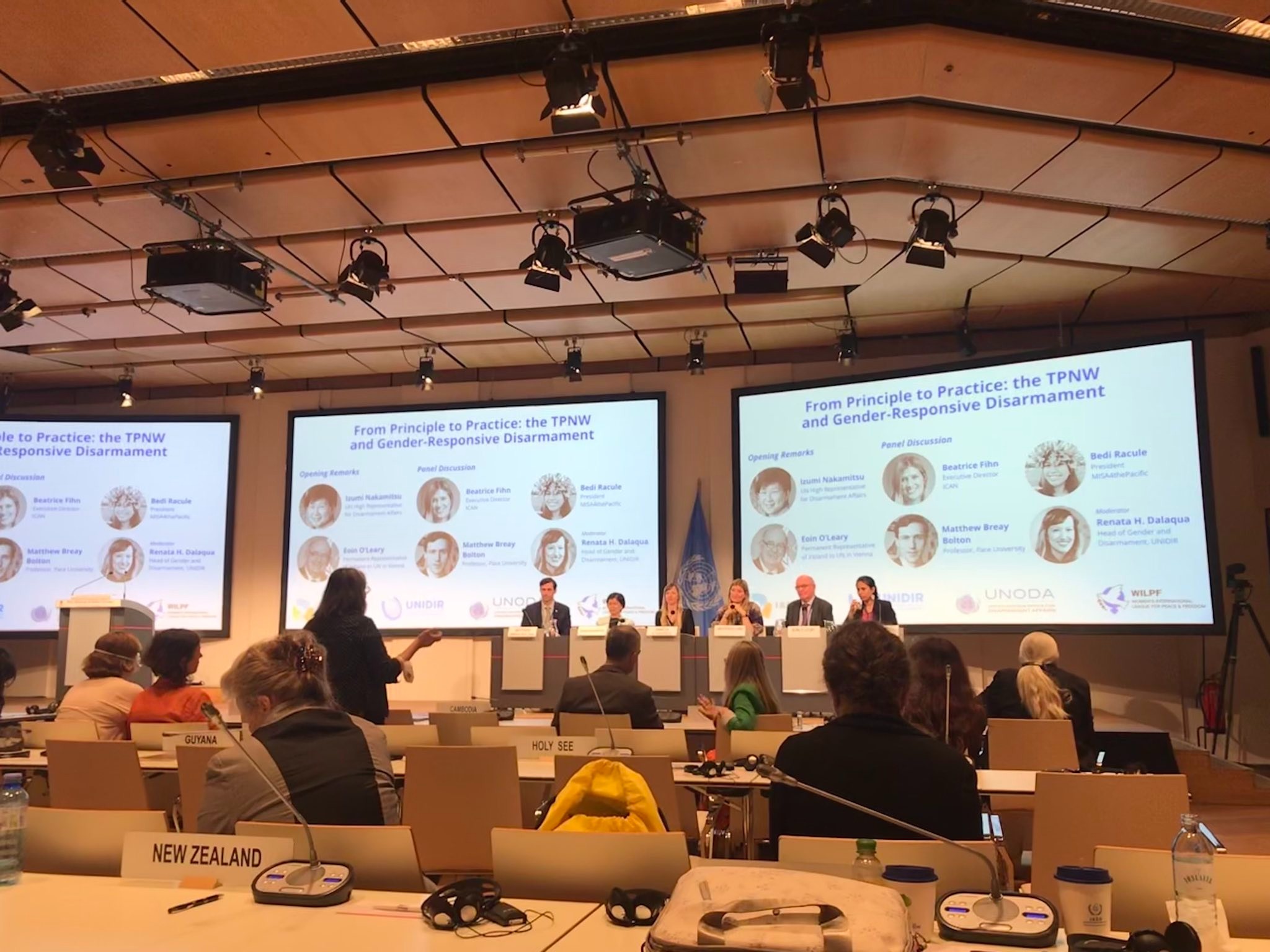Report about the side event on gender-specific provisions of the Treaty on the Prohibition of Nuclear Weapons
Article by Michelle Benzing and Flavia Keller
On Wednesday, 22 June 2022, the UN Institute for Disarmament Research (UNIDIR), together with the delegation of Ireland, UN Office of Disarmament Affairs (UNODA) and WILPF co-organised a side event to the First Meeting of States Parties (1MSP) highlighting the gender-specific provisions of the Treaty on the Prohibition of Nuclear Weapons (TPNW).
Following a session on this topic during the ICAN Nuclear Ban Forum on Saturday, Wednesday’s side event moderated by Renata Dalaqua (UNIDIR) provided a second opportunity for engaging with a gendered analysis of the TPNW during this Nuclear Ban Week.
The session started with opening remarks from the UN High Representative for Disarmament Affairs, Izumi Nakamitsu, who highlighted the fact that gender provisions are still largely absent from legal mechanisms in the field of disarmament. Against this background, the High Representative reminded attendees of the TPNW’s historic significance as it recognises age- and gender-specific impacts of nuclear weapons and calls for gender-responsive action to be taken to remediate them. The Permanent Representative of Ireland to the UN in Vienna, Eoin O’Leary, emphasised the linkages between the TPNW and the Women, Peace and Security (WPS) agenda and the opportunity for states parties to create a new threshold for gender-responsive disarmament.
Gender-specific provisions
At the beginning of the panel discussion, Beatrice Fihn (Executive Director, ICAN) pointed out that women have been at the forefront of linking gender and disarmament in their long-standing campaigns for arms control treaties. In the context of the TPNW, this is crucial because of the differential effects of radiation on women’s bodies, as well as issues of social stigma disproportionately affecting, for example, female hibakusha. Fihn concluded that the goal is not only to increase women’s representation in the TPNW negotiations, but also to dismantle gendered and patriarchal norms that sustain the supposed “safety” through deterrence. For Fihn the TPNW is a “feminist treaty” due to its recognition of nuclear disarmament as being “rational”. Matthew Breay Bolton (Professor, Pace University) agreed by speaking about the transformative potential of the TPNW to shift the discourse away from national security towards a more human-centred perspective on security.
Bedi Racule (President, MISA4the Pacific) continued by sharing powerful stories of Pacific women, among others of Darlene Keju. She emphasised the disproportionate impact of nuclear colonisation on women’s health in the Pacific and highlighted the lack of health infrastructure, therefore stressing the importance of articles 6 and 7 of the TPNW in bringing justice and safety to those most affected. Bolton’s analysis went beyond the biophysical impacts, mentioning social systems that perpetuate disproportionate burdens of care work. He emphasised that therefore assistance should not only be considered individually but in light of the broader community and the gendered roles within.
Operationalisation
When asked about the operationalisation of the positive obligations under articles 6 and 7 of the TPNW, Bolton referred to working paper 5 facilitated by Kazakhstan and Kiribati (TPNW/MSP/2022/WP.5). He specifically emphasised the need to take seriously the assessment of concerns and needs of victims and survivors, not only focusing on the global level and the past but highlighting local impacts including in the present. Bolton stressed that policy frameworks need to be established to guarantee operationalisation, including an international trust fund to channel assistance.
The challenges with regard to operationalisation were also highlighted by Nakamitsu during her opening statement. The High Representative underscored the need to share knowledge and work toward context-specific policy frameworks. In his remarks, O’Leary made reference to working paper 2 submitted by Chile, Ireland, Mexico and UNIDIR (TPNW/MSP/2022/WP.2) which recommends that gender issues be integrated into all treaty-related national policies, programmes, and projects. He emphasised the need to create linkages between policy processes, in particular with reference to the WPS agenda. Like O’Leary, Nakamitsu pointed to the possible gains to be made if states parties managed to integrate the positive provisions of the TPNW into their national action plans on the WPS agenda, specifically under the relief and recovery pillar.
Incorporating intersectionality
The panel concluded by discussing questions from civil society representatives, particularly on breaking down the gender binary and incorporating intersectionality into the treaty. Fihn stressed the importance of pushing progressive issues such as the inclusion of non-binary and trans perspectives and welcomed further discussions on the issue at the next MSP. Bolton concurred, noting the crucial role of LGBTIQA+ networks leading movements in nuclear disarmament. He stressed the importance of incorporating the concept of intersectionality in analyses of the social stigma affecting groups due to overlapping forms of marginalisation based on indigeneity, race, class, and gender.
Fihn highlighted the racialised coloniality of nuclear weapons, stressing the fact that testing occurred primarily in former colonies. These forms of dominance and power are also visible at the negotiation table where some states are seen as more relevant than others. She countered these hierarchical structures by stating: “every single country matters”. Speakers overall agreed on the necessity to further incorporate the perspectives of affected communities in decision-making processes. Finally, Racule addressed the challenge of transforming the persisting youth movement into a global movement of change and called for making the ban on nuclear weapons a matter of and for all. In conclusion, Racule echoed the words of High Representative Nakamitsu: “this is only the beginning”.
The report was published in the Nucelar Ban Daily, Vol. 3, No. 4, Reaching Critical Will (WILPF). You can download it here.

